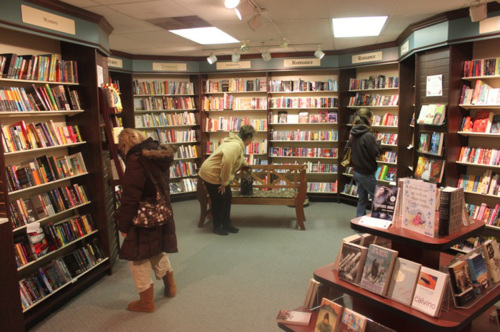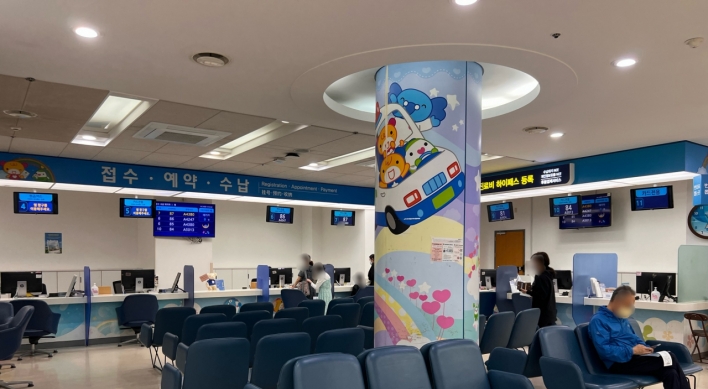‘Focusing on good books, experience: key to success’
As thousands of booksellers around the United States lose their jobs this month at bankrupt Borders, Nicola’s Bookstore buyer Bill Cusimano feels no pain.
Here in the cramped back office at this profitable, American independent bookstore, Cusimano is swamped getting new orders in for rush customers, planning events such as the appearance of local Caldecott Award winning children’s book author/illustrator team Philip and Erin Stead, and making sure that the poetry section is restocked.
On the day Borders set a one-day record in American book retailing by closing 200 stores and seeking bankruptcy protection for more than $200 million in publisher debt, Cusimano and owner Nicola Rooney were busy serving a steady flow of customers browsing a selection of 52,000 titles. And unlike their cross-town big-box competitor, they were paying their bills.
Just minutes away from the devastated Borders/Waldenbooks headquarters, Nicola’s is part of small, surprising rebound in American Bookseller Association independents. With 1,800 members like Nicola’s, up 50 from a year ago, these smaller stores have benefited from the buy-local movement. Rooney also has succeeded with a steady stream of high-performing celebrity events off-site while nurturing first-time authors with something important to say.
Is it possible that small retailers can flourish in the neighborhoods where superstores have failed?
The answer is a firm “maybe” in a depressed retail environment where flat sales are considered the new up.
When Rooney, a former chemical engineer, opened her store in 1995 a friend warned: “You’ll love it and you’ll make absolutely no money.”
Many loyal customers worried about Nicola’s viability at a time when Borders was hemorrhaging billions of dollars and returning millions of unsold books.

“Yes, bricks-and-mortar physical bookstore business is shrinking,” she admits. “But if you are in an area where you have the right kind of people with the right kind of disposable income who want to spend on books, you can succeed.”
One of Rooney’s secret weapons is that she has stayed true to the spirit that made the original Borders a hit when it opened here 40 years ago. The focus, says Cusimano, is not on blockbusters heavily discounted at Costco, Walmart or Amazon, but good books that people want to buy.
“Look at this one,” says Cusimano, pointing to a new $60 underground railroad title. “It’s working.”
Today it takes more than good books and coffee to make a profit. That chain bookstore customers have a choice gives Nicola’s a chance to outperform her competitors with a higher staff to customer ratio.
Experience also counts. Personal relationships between the store’s 15 employees and buyers makes a difference, particularly in the ever-expanding children’s department where print titles remain strong. Another draw is classy sidelines including many made-in-Michigan products.
Unlike Borders, this store has not put a big push on e-readers, which cannibalize more profitable physical book sales. “We’re lucky to make $2 on an e-book sale through our website,” says Cusimano.
“The margins are much higher on print books. Also, you have to remember that for all the hype, e-books are still only 10 percent of the market and they are strongest in the bestseller areas that are not our focus. There are people like me who find the e-readers harder on the eyes and slower going than a print book.”
Cusimano also disputes the idea that Kindles, Nooks, iPads and other e-readers will steal away all younger readers from print.
“Kids like new gadgets,” he says. “But in two years they’ll be on to some other new toy.”
“The key,” says Rooney, “is a customer who comes in after you recommended a great book for their son and asks the buyer to suggest another exciting title. Our clerk might even remember your son’s name, something that might not happen at a chain store.”
Cusimano also believes some chain stores suffer from an ineffective top-down management style. “Barnes & Noble has survived because the Riggio brothers at the top are book people. Borders has been hiring top management from the grocery and apparel business. They didn’t give store staff enough autonomy. A few years ago I went out to the mall store they are about to close here and found multiple copies of four different versions of James Joyce’s ‘Dubliners.’ An independent bookstore buyer like me would never do that.”
Convinced that small is beautiful, independents can succeed where goliaths have failed. Cusimano points out that some of Borders modest footprint Waldenbooks locations are succeeding as reborn independents. “The average American Booksellers Association independent is around 2,100 square foot. No one wants a 24,000-foot Borders-size store. That might have worked when they were selling music and DVDs but it can’t work now.”
Cusimano also believes traffic issues can hurt big-box stores in urban areas. “We get the largest share of our business from our own zip code. Sure, someone might drive five miles to get to us after they lose a Borders cross-town. But in Miami driving five miles to get to a superstore might mean crossing 16 neighborhoods. People want to shop local.”
Isn’t it just easier to buy books online where there is no sales tax?
“Believe it or not, the sales tax issue can work in our favor. Part of the momentum behind the buy-local movement is the fact that retail sales tax benefits the community and is a good way to keep the overall tax rates down.”
Could this local touch be a blueprint for independent retailers up against big competitors?
“For a retail store to work it’s got to be part of the community,” says Cusimano. “Sure, we do big events with authors like Anthony Bourdain or Elizabeth Kostova but we’re also doing poet Martha Rhodes reading at the University of Michigan’s English Department. We’ll be lucky if we sell five books. But if you’re going to be an independent bookseller you have to provide a venue for the literary world, even if it’s a loss leader.”
By Roger Rapoport
(McClatchy-Tribune News Service)




![[Grace Kao] Hybe vs. Ador: Inspiration, imitation and plagiarism](http://res.heraldm.com/phpwas/restmb_idxmake.php?idx=644&simg=/content/image/2024/04/28/20240428050220_0.jpg&u=)

![[Herald Interview] Mom’s Touch seeks to replicate success in Japan](http://res.heraldm.com/phpwas/restmb_idxmake.php?idx=644&simg=/content/image/2024/04/29/20240429050568_0.jpg&u=)


![[News Focus] Lee tells Yoon that he has governed without political dialogue](http://res.heraldm.com/phpwas/restmb_idxmake.php?idx=644&simg=/content/image/2024/04/29/20240429050696_0.jpg&u=20240429210658)








![[Today’s K-pop] Seventeen sets sales record with best-of album](http://res.heraldm.com/phpwas/restmb_idxmake.php?idx=642&simg=/content/image/2024/04/30/20240430050818_0.jpg&u=)